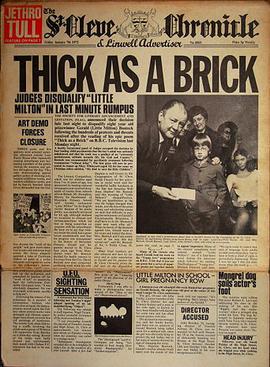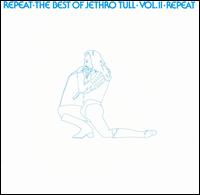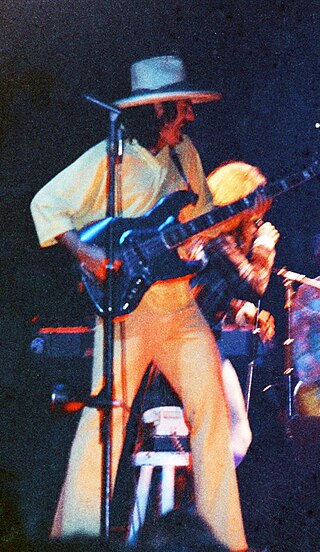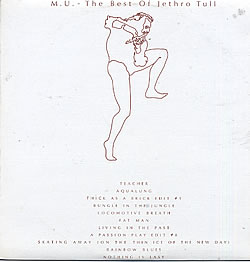Related Research Articles

Jethro Tull are a British rock band formed in Luton, England, in 1967. Initially playing blues rock and jazz fusion, the band soon incorporated elements of English folk, hard rock, and classical music, forging a signature progressive rock sound. The group’s bandleader, founder, primary composer, and only constant member is Ian Anderson, a multi-instrumentalist who mainly plays flute and acoustic guitar, and is also the lead vocalist. The group has featured a succession of musicians throughout the decades, including significant contributors such as electric guitarist Martin Barre, keyboardists John Evan, Dee Palmer, Peter-John Vettese, and Andrew Giddings, drummers Clive Bunker, Barrie "Barriemore" Barlow, and Doane Perry, and bassists Glenn Cornick, Jeffrey Hammond, John Glascock, Dave Pegg, and Jonathan Noyce.

Thick as a Brick is the fifth studio album by the British rock band Jethro Tull, released on 3 March 1972. The album contains a continuous piece of music, split over two sides of an LP record, and is intended as a parody of the concept album genre. The original packaging, designed as a 12-page newspaper, claims the album to be a musical adaptation of an epic poem by fictional eight-year-old genius Gerald Bostock, though the lyrics were actually written by the band's frontman, Ian Anderson.

Aqualung is the fourth studio album by the British rock band Jethro Tull, released on 19 March 1971, by Chrysalis Records. It is widely regarded as a concept album featuring a central theme of "the distinction between religion and God", though the band have said there was no intention to make a concept album, and that only a few songs have a unifying theme. Aqualung's success signalled a turning point in the career of the band, which went on to become a major radio and touring act.

Repeat – The Best of Jethro Tull – Vol II is a 1977 greatest hits album from Jethro Tull, featuring one track which, up to the time of this album's release, had not been issued. The album's first volume was M.U. – The Best of Jethro Tull.

Minstrel in the Gallery is the eighth studio album by British rock band Jethro Tull, released in September 1975. The album sees the band going in a different direction from their previous work War Child (1974), returning to a blend of electric and acoustic songs, in a manner closer to their early 1970s albums such as Benefit (1970), Aqualung (1971) and Thick as a Brick (1972). Making use of a newly constructed mobile recording studio commissioned and constructed specifically for the band, the album was the first Jethro Tull album to be recorded outside of the UK, being recorded in tax exile in Monte Carlo, Monaco.

Benefit is the third studio album by the British rock band Jethro Tull, released in April 1970. It was the first Tull album to include pianist and organist John Evan – though he was not yet considered a permanent member of the group – and the last to include bass guitarist Glenn Cornick, who was fired from the band upon completion of touring for the album. It was recorded at Morgan Studios, the same studio where the band recorded its previous album Stand Up; however, they experimented with more advanced recording techniques.

John Evan is a British musician and composer. He is best known for having played keyboards for Jethro Tull from April 1970 to June 1980. Evans' father was headmaster at a Derbyshire village school and his mother was a local concert pianist and piano teacher. The family moved to Blackpool, Lancashire in October 1949. Evans was educated at Blackpool Grammar School, where he met Ian Anderson and Jeffrey Hammond, and Chelsea College, now King's College London.

Martin Lancelot Barre is an English guitarist best known for his longtime role as lead guitarist of British rock band Jethro Tull, with whom he recorded and toured from 1968 until the band's initial dissolution in 2011. Barre played on all of Jethro Tull's studio albums from their 1969 album Stand Up to their 2003 album The Jethro Tull Christmas Album. In the early 1990s he began a solo career, and has recorded several albums as well as touring with his own live band.

Jeffrey Hammond, often known by his former stage name Jeffrey Hammond-Hammond, is an artist and retired musician best known for being the bassist of progressive rock band Jethro Tull from 1971 to 1975. With Jethro Tull, Hammond played on some of the band's most successful and well-known albums, including Aqualung (1971) and Thick as a Brick (1972).
"Aqualung" is a song by the British progressive rock band Jethro Tull, and the title track from their Aqualung (1971) album. The song was written by the band's frontman, Ian Anderson, and his then-wife Jennie Franks.

Ian Anderson Plays the Orchestral Jethro Tull is a live album and DVD by Jethro Tull frontman Ian Anderson, featuring the Neue Philharmonie Frankfurt, conducted by John O'Hara. The DVD was recorded at the Rosengarten in Mannheim on 8 December 2004.

Living with the Past is a live album by Jethro Tull. The first half contains material from the Hammersmith Apollo performance on 25 November 2001 and features songs from different eras of Tull's history as well as some pieces from Ian Anderson's solo albums: "The Habanero Reel", "The Water Carrier" from The Secret Language of Birds and the instrumental "In the Grip of Stronger Stuff" from Divinities: Twelve Dances with God. Aside from "Cheerio", other recordings are collected in the second half.

M.U. – The Best of Jethro Tull, released in 1976, is the first proper greatest hits album by Jethro Tull. It spans the years 1969 to 1975. The earlier Living in the Past (1972) compilation mainly dealt with non-album material, but this album only features one previously unreleased song, "Rainbow Blues".

"Locomotive Breath" is a song by British progressive rock band Jethro Tull from their 1971 album, Aqualung.
"Cross-Eyed Mary" is a song by the British progressive rock band Jethro Tull from their album Aqualung (1971).

The Best of Jethro Tull – The Anniversary Collection is a greatest hits album by Jethro Tull, released in 1993. It includes some of the band's biggest hits from 1968 to 1991.

The Essential (2003) is a greatest hits album by Jethro Tull, digitally remastered. The songs included and their order are the same as Tull's first greatest hits album, M.U. – The Best of Jethro Tull. It is not to be confused with the similarly named Jethro Tull compilation "Essential", released in 2011.

Living in the Past is a double album quasi-compilation collection by Jethro Tull, which contains album tracks, out-takes, the "Life Is a Long Song" EP, and all of their non-LP singles except for "Sunshine Day"/"Aeroplane" (1968), "One for John Gee", "17" and the original version of "Teacher" that appeared in the UK as the b-side of "The Witch's Promise" in 1969. Also included are two live recordings taken from a performance at New York City's Carnegie Hall in November 1970.

"Hymn 43" is a song by British progressive rock group Jethro Tull. It is off their Aqualung album and was released as a single by Reprise Records. The song reached No. 91 on the Billboard Hot 100.

"Teacher" is a song by the British rock band Jethro Tull, first released as the B-side to the January 1970 single "The Witch's Promise", on the Chrysalis label. Written by the band's frontman Ian Anderson, the song is a comment on the corruption of self-styled gurus who used their followers for their own gain.
References
- ↑ Enos, Morgan. "Jethro Tull's 'Aqualung' At 50: Ian Anderson On How Whimsy, Inquiry & Religious Skepticism Forged The Progressive Rock Classic". Grammy. Retrieved 10 July 2022.
- ↑ Moore, Allan (10 August 2004). Jethro Tull's Aqualung. A&C Black. p. 42. ISBN 978-0-8264-1619-3.
- 1 2 3 Rabey, Brian (1 October 2013). A Passion Play: The Story Of Ian Anderson & Jethro Tull. Soundcheck Books. ISBN 978-0-9571442-4-8.
- ↑ "Jethro Tull Press: Disc & Music Echo, 20 March 1971". Tullpress.com. Retrieved 1 June 2021.
- ↑ Gerson, Ben (22 July 1971). "Aqualung". Rolling Stone. Archived from the original on 2006-05-07. Retrieved 2015-04-08.
- ↑ Staff, Rovi. "Jethro Tull - Aqualung". AllMusic. Retrieved 10 July 2022.
- ↑ Tobia Jr., Geoff (19 March 2021). "Revisiting the impact of Jethro Tull's 'Aqualung' 50 years later". The Tufts Daily. Retrieved 10 July 2022.
- ↑ "Album Of The Week Club Review: Jethro Tull - Aqualung". Louder. 26 March 2018. Retrieved 10 July 2022.